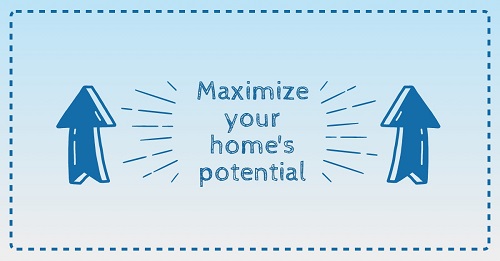Simple ways to boost your home’s potential


If you plan to list your house in the foreseeable future, it’s crucial to do everything you can to maximize its potential. Increasing your home value not only makes it a better place to live, but ensures a quicker sale and higher price. While it might seem like a daunting task, there are some simple steps you can take to boost the potential of your home before putting it on the market.
Invest in curb appeal
Your house’s curb appeal may dictate how quickly your property sells. If you allocate time and resources to transform your home’s exterior from drab to fab, you may be able to reap the benefits of a speedy home sale.
You don’t need to completely overhaul your landscaping to benefit, either. Simple changes like mowing the lawn, adding container plants and repainting your front door all have a huge impact on a first impression.
Clean & declutter
Before you even put your home up for sale, take some time to do a deep clean and decluttering. Now’s the time to get rid of knickknacks and furniture that have accumulated over time to create a more open and inviting space.
It’s also a good time to neutralize your decor. This could mean anything from removing personal items to repainting your walls. Opt for light, neutral shades of paint and simple window treatments to highlight the best features of your home.
Hire a home inspector
Home inspectors are trained to find any possible issues with your home before it’s too late to deal with them. An inspection report will include details about major home systems and overall structural integrity.
Need help finding a great home inspector? Ask your real estate agent for a recommendation. Your agent can even help you with logistics and communication during the process.

While selling your home is a huge undertaking, there are small and simple ways to maximize its potential before it hits the market. Work with your real estate agent to prepare your home outside and in, and you’ll ensure a quick sale at a fair price.
Top reasons to declutter your home before you list


When you’re ready to list your home on the market, you may want to take pictures and compose a listing description
right away. However, before doing these steps, it’s a great idea to declutter your home.
Give the illusion of more space
Not only does decluttering your home make the space more tidy and clean for viewing; it also gives the illusion the
property has more surface area.
When you declutter, it removes visual interruptions which could be a distraction from the property itself. With a
full view of the home, potential clients can get a better picture of what to expect from the home and also start to
visualize their lives within the space.
Decluttering depersonalizes the space
When you’re preparing your home for listing, it’s important to remember the space will soon belong to a potential
buyer. By decluttering the home and taking down personal photos and items, it opens the door for potential
homebuyers to envision their future in the space.
Quicker moving time
Decluttering your home can greatly cut down on the time it takes you to move out of a property. Doing an inventory
check of your belongings, you may find many old items that haven’t been used in a while.
Once you decide whether these items are of value or not, you can discard them – depending on your personal appraisal.
This, in turn, means fewer items to purchase moving boxes for and pack away.
Even though decluttering your home before listing may seem like a hassle, it can yield wonderful results for your
home selling journey.
Major Types of Veteran Mortgage Relief

If you have a VA loan, the U.S. government has options in place to assist you in case of financial hardship. There are multiple programs available to help you avoid late payments and foreclosure if your mortgage meets eligibility. Here are the major veteran mortgage relief options to know:
Refund Modification
A refund modification affects the principal and interest on your existing VA loan. This option allows the Department of Veteran Affairs to purchase any past-due payment and principal loan balance, given the amount falls within certain limits. Refund modification can result in an overall reduction of both principal and interest by up to 20%.
Partial Claim Option
A partial claim program helps cover you in a scenario where you can make current payments, but have accrued a past-due balance. With a partial claim option, you can resume your regular monthly payments again as soon as you’re financially able, while any unpaid late payments are taken over by the VA. You’ll owe the amount at the end of the mortgage, but it will not accrue interest while the VA holds it.
Loan Deferment
Loan deferment is one of the simplest mortgage relief options available to veterans. A loan deferment creates an agreed-upon period when you don’t have to make regular payments on either principal or interest. It’s essentially a “pause” on your mortgage until the end of the deferment period, without any interest accruing during the deferment time.
Forbearance
Loan forbearance is very similar to deferment with one crucial difference. If you receive loan forbearance, you can pause making your mortgage payments for an agreed-upon time period, but interest will continue to build. While forbearance can be an excellent way to mitigate financial hardship in the short term, it can sometimes result in paying higher than the original required amount due to the continuing interest.
All of these options are great ways to avoid foreclosure and late mortgage payments. Remember these programs if you need mortgage relief.


 Facebook
Facebook
 X
X
 Pinterest
Pinterest
 Copy Link
Copy Link

